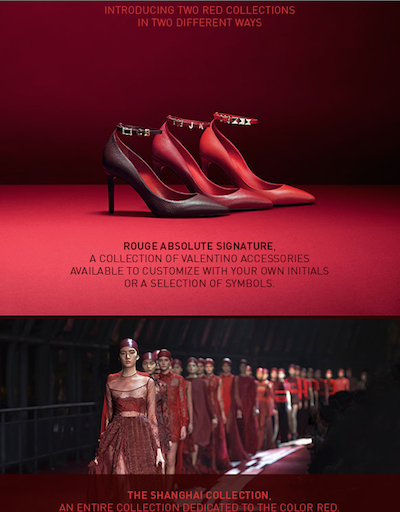A new report by the Luxury Institute found that millennials scrutinize investment value and heritage of purchases more than Generation X'ers and Baby Boomers.
The study also found that millennials regularly search for one-of-a-kind items as a way to signal status. While brands often treat "showrooming" as a threat to brand integrity, the research that accompanies the trend indicates that improved customer service and responsive multichannel efforts can turn the phenomenon into a benefit and a source for more revenue.
"Millennials want the heritage of the brand, they respect history, and they see it as a validation of investment value," said Milton Pedraza, CEO of The Luxury Institute, New York.
"They don’t have all the money in the world, they're just starting out, so they want to make sure they’re buying appropriately," he said.
"But they do have much higher expectations, so that’s a little bit of a paradox. They care far more deeply about certain aspects of a luxury brands."
This study is the first in a series of three comparatives studies of millennials, Gen X'ers and Baby Boomers by The Luxury Institute.
Discerning through the ages
Luxury Institute's report affirms the notion that luxury consumers across age demographics value quality, craftsmanship, customer service and design.

Valentino Rouge Absolute Signature email
Survey respondents also cited convenient return, refund and exchange policies, lifetime guarantees, and free shipping as essential to the luxury experience.
The proliferation of digital retailers has raised consumer expectations overall. Bricks-and-mortar retailers have to contend with the many incentives such as free shipping, reduced pricing and free samples offered in the digital space.
On the other hand, the report argues that the rise of ecommerce has led to a few dead ends. The reliance on algorithms to steer consumers toward predicted interests strikes many as inauthentic and heavy-handed.

Stuart Weitzman post for Coachella
Luxury shoppers want to see assistance options online that resemble those found in-store, whether that means real-time personal shoppers or just a social media presence capable of fielding questions on the fly.
Not so fast
The report challenges the perception that millennials are fickle, impulsive and anonymous shoppers. Millennials tend to be more knowledgeable about luxury products and services, while Baby Boomers tend to rely on previous experiences.
Far from an affront to the structure of retail, showrooming signals the highly-discerning nature of today's consumers.
Indeed, retailers should give up the fight against showrooming. Instead, retailers should insert themselves into the consumer process of going back and forth between channels to compare prices and inventory.
Consumer tendencies are fragmenting geographically as well.
A new report by Boston Consulting Group explores the online shopping tendencies of Chinese consumers such as a widely-held penchant for researching products at length.
“The Chinese Digital Consumer in a Multichannel World” report explains that the number of Chinese online shoppers is expected to reach 380 million by 2016, which presents brands with huge swaths of potential customers. Any giddiness marketers feel at such a prospect should be tempered by the fact that only .5 percent of online activity is conducted on brand or company Web sites (see story).
"Sometimes I want to go into the store, get a product and not talk to a human being," Mr. Pedraza said. "But there are other times when I want a human relationship, the experience to be curated.
"It's not an either or proposition," he said.
Final Take
Joe McCarthy, editorial assistant on Luxury Daily, New York
{"ct":"tKHZsltjYg9uz2GWw4p0qR5u1DrrjLT0\/J+F+luoKnGQBrNX7eub4O56qi9U45ibOk+KRjqr2EJKuWWAjEPkiXvalhM4VW+8+ks\/LLc0M7ib\/gUxLmD8okodS5khU+Q3rY\/CVTpIk0dgXo++wXJfREd3Gsvqnn7oTzF0kjL7kDTA7JmOEU41MNCs8AyZP24OQPVDZvx0Ii+m11PWXDQ8sAolxpEz8EN1YVVW5rj8nSpdbr9Xl8F7vADvKGrGB8uALw\/WrqEwyr2VyotYrnM7M2DyHppeHIR0cRPQU922897wRwz8ifwh47xgcwYaKRVwTy6FY48suwyjya2a8tJ9+y5bQSW+9SA7iwRMFU\/d5nmzw3RJdbTdwe5iwsJ0X353+YGFce06oyGCLP3J9sRUmAG87J8x4\/L18Wjun0ZLv5Efwr\/dAqlUJ1EZP3SjG8gu5fC\/t+1ZTYl6jnseGY5EsYBbznNbZvl0mjjwYUOA6\/s4F4NwBIIb\/ONUwiVPEpR+Smo6gpg+nYMJqxV3U7GsdDLMPb0yiilO4YxIVBvbRgyKfsRs1hka8aX9uYHiyz6UhkTYTXHWdOMgNT2r\/\/YqoY7+yMSHZpDzlZbWJwePv9r0wq7SRpswrDCsKkkbKs\/\/w3ypZHgd3OT7W\/VdJCpGpdXQ3DdJwZyvN3qlGWOLYPJAvir\/ktbjXkc0C8j5J8XlhivKgRKdu4d6uEYaSqb6IcGWHt7efZUQFXdojJzpaMzcX+\/fPXXmXJ01n3EdblwKhe1BKO7XccTPQlg2joQqEO1EiO\/5RyALTosFUv1rRYu9PhZ2ySaoVqDjMe6RSEPe9uRWU0CH1oOm2G2XaksRj7HF5NsczUhLWQcW9KsOMYjiecQO+YVmZ8LhCeNoOl0z3bhWHSaF\/fO6bfwL8lY\/Tsf8qWTwcYNH1wY\/FWbkPyR1f43ijFjtrhjtfzvJaYa9zt6yG5YJM3eCS1vprv3nuRot9wB2bwyUnkpzijFsyrjIGWabMU9BtfOf911\/MYMiMXdFM3VO1nQ+X565CU2A3lcPwegLCyCxhwvtQufWsPTbW13C889QT0ei\/hGG6ynVWxV9P3VVD0uzvVHQUdkzruySgGTdLhy4FCH4E69HvI\/uXBzpULK6Td7GwXhZMDaG2nnAu2jXJYgtrQJOS1RnMJJG29ScIIMageqWW6KBZoUcQTkPSW4rzA8sECGe9Jp3og5Cj7lPUS8UwDZoH1Y8KE5GL+SZ0esandVa8rEy4rPplrqdsSb0OeHkZyuTNDyTDk8mEfQ8hQzBkUeeHN5XbzzBchNMa1PKIQy6FgcWTOy5N3pHlIbzbruzQf5Nztqj5c2R639dQNP3uVobPjlJaFZS8+xAPaeCNP7sdRqih0l4AOLRZsRb2Mpr0bs6eZarF1ur7E\/T3Dt8WjVbu+hK69E8d4T34k2FTrfVsTJ5pnMPYvzuKXp4LTINheJKe1JpLT8ijAoVV7+BeHPo9wCnqd8dvyzM6k46HKTlW1vTp6DYfAUGjC8U\/kB8l52wflk29DBwp+kUKkdxeoCt9urFFyDStWvWnmytpZ3n1nDEzMFjKc2lpteEkb8c1lri6Id4P0GSskN1\/nDjLP7eghhPR1n\/yc05z4F53a4vSJPFprrku4yqhS38WX+YNgO7vhB2y9Lq\/2ZzfrvJjssX0ftIhwDs9GIMyeHZrHuvfM3rHoo3hT4Kc5nkuMkBtCGv75rdvcR5qSLj5qCFzfN78e4Tnt1A+CFmeTDtq3xd3nOHHFzyr331DDdbVVjGvNUTXoqacVKAMn+H6jqcwbtYkPdwmMtCeZnnJMFrATuH\/YURiYYEqOslhKKv8tXdzgey3QmueyR31YOrDsRXQr0J6f+vxB6WHQ11SNYp5YDp6Qp4p+5FlZtnY48ks+UteMt+8uhTmj0FePO4UPtU9ehhn3JwmgUzUbmMqZvA60tyZetqdDIxFSg9Zz02V\/h7\/McotFfms5sfSvpYSx059yq\/cXkoKRqis1tQQQohlJsMIyE5TUgOjCBzqJHxUEo975DbTQ\/jpqZyYxAAKwd\/NjGUAn9PvUxU5W1IAFzQd0W9MlMcNLjPTr\/XLWihtYM3xYB8PyFJIxQ98eEje0dqbxZozq22oQooYDF4mgCTikkHwrIgi9PUgRENpw+uRJJTba5fit3opUtOJUvCnU6eAdN9110CFArsJafZT0jm6XvI8nunEqIvy5KWS5wt8pC6fdLw1tAx0xwVDuyRIyJs5MgQqFo++Fy612l0iUR5HLKHWkdiUhYqGwsFdbMqoLQa+lJG1kLa\/zqPWdEFo3USu2HB203gtx4\/QfIP8JQqJpwQrE8HFxHfpI6Yx7iDoG23K9jxBmSNChrIRVnMAhGTYJC+HzZrM7DF8w6Kk213+80qnaoQeAtiRwRsOFdDZPTsxcfgNkHi2dJJ8Rqsh2gsiP3bNxEtcgz9dUjCNC5coCq2oxWGuZ7JOlEv9pB\/0uQQWCBut3k60O30\/R0YcKwd4Cids5HHAzQ+nX9SRaoBy1y\/XAeCA0N70DqT14oE9qqd7uxq6lg4\/oQfW7PX\/GvQBMY9dC1lD96Wt0l+979HIiJqyLFP1j1oBQRjTAEWCv5InBMzhfbiWKW2ruTFarky5RfhhEBQRVEsQGjk1AB4tkLTv9\/Q5A2emkabdszdjKquiWTrsWGX8eujQJ0amXWo4XbI30+pswtupyWE4y7hABOAsB\/R3bN\/pwo5umWDx9KXWfbmYkq3QTiQzU6PjkWlteY7HGX\/ZmyWwhXGBwMAlmYQBQ7JmtqNBYKXX5phtWCLL+\/eLBnPeGoPm2ThHuyGef9tDHUu6mbFj3nabeshjn0ylIoXZejdPjURDauK3A6h6a\/OLl8cTHQ76bFipFLSPByN9SR2VcYjC5yeVDekgNOUj2usovi8QC9iaafWbFIRNgs4964GDx9VyLGSgTFBDh0454Bdg6SUbNxgat8uFVjf9uyypepTGcWQJupuxpzl8JpUPI7ivXDS5XqoIWJeEmMnN884SEriczvs2ZKksCbtVGhri2pT6lDpfYpgX3vXHIFL\/7Ypq\/VpRDr3\/lfpzXAEh22cfOynKllxyxUkMVScCVJ1oQ45n3zG0BJThRub6MOn2PyvbtaNvHSj7ye8mnxOIr3FX3ELPTuOg8bXg53s685FIZQWjWpyV\/oFLjWr\/2itATiCfrHKy1ekeLXYiC8r8uvR93HAGj\/rFAo9KS4RBzCCqKPuUEzgpCtikocDRCRTViXJj5gdyOSnF2CgBeD2fxGDjgRB0RmBC\/LDw3eo56Nojroccgmr8sK3\/Tg1MIOjDP7DpOF\/3gb79GtVTvU8EswtS2T3BTpHLakR0zayHxGg2TIJeHjunC4f2wCsXLWkdbsHtuRVRwGJPbzwaQKNILK5eTZHi7Z\/RUxpuq2RmM2rX0tnuQJcg5M3MCMV5Ja\/X35iLuPrFDPXYALcKCjgT1s1CAYpW5D9iOkfCUlT+YMo4Btw0UX3WeVWYZm39ph1p2MvuN02AugBv9Jc7bVwjxEtquqp5QN\/12fAtuFyz7VGtjJBEyPxk9su\/31wGaXVqlVK2Bb0mVHmP\/sxR4p\/BGK5BZA16nWP0gvFEfYu33EC2cAkvIaw2X+k2zBtbbOIUWZlm2BVe2joZqECyAPrPeRMRRkvXHjyGYDEqxhnAnRxkH6Q3\/+saUXzXJdZVlzaSF4jXu8OKvxydEMXNdYJOwfJ1NUNDtbZ2a5aWwQ0kKDEjnPP5y\/2T7g6lmdAKYGf4McgzFM2l+5T9dKpWfmd4eSj2ZUMd4bmPvytjoNx1Iq5+8c32duQl1uOvhX2MiUta5Ozw1hh1a7Y\/qtIJIVAmf5o55MDdjC3Tm+53YCE5W3gd4JapaxsQDiWcdA+LDggT5RSAbnFr+OVs1TDQp1V6XSfxu1AfsIwV2t+vBt5N20iw34LnamWXq1Ze6AJuSoG6yniOGpXB+IkBmgQ1Tfmlaw7358yYGA\/eBmk4bCQbTAFNL35dnVoVCRORjRdecrij+Cwje4dmZ922BBkky5ADe8ceOxUGSkvusL0+J7LhUWpIcl42mNqCEFIj2ysaxeYowK4qRKRvd1t+y0\/SN+XMjiK92b1XLEOFYh4TUADPZWDEYayLaq+XZ5cx5Pw3VVIOxRl\/LHXs3p38nvb3YygY6aKXvPOx\/V5KRC1+apPwZSnVtQT5D9LTWsOyqNp13m0ZhcaI6zJqWLXltfK2cE0sMrPKyoRGFOidubxSeM+bKxf38tR85sr5ytvfDBu7\/A7iOpve5xYT2jd2yCtb\/zwIPSdWI13gnWhnP341Jzhfzs7pS3ifJbcDzUM4lcpPkGKbfZ0BJq9gKwwbThZ6bBxOlk1TS7fT1hIH2cjc\/kZwmc8qWtF30N02ID+qNQshKlVO8ZtzggcmAv\/KlUaM42KILLnu7RVCj7\/mGzPtoSShgEq4fyLQ0P1d4HWDLgI0un5zImUtlGcRgLPqf8OYuCBhtoPDMbmWFi4JvKjakus5fxuQF38lrm2R7Q2OAqkmLxXXw6l2ialQ68R0a0Kdy6JBQ\/pzb8Avhnfo86IptGpeo8zCO6NC9315P6\/9PREOL8tXfyuXfzdGgb\/57wLcq0oG7kzPe+N56Kwj7vZRQncH5m64GCOQONwdRnqv8MLdRqdWBJy4zrl3BnvbWRRDj2WMeCv23\/fqUk39mgda7cMpiqDQ1y8XmMkjDmXhKu\/7UIy+vOKk7MmgSlqyhecSfiZsE+Q+ktYYjZS\/dWyu4ras7SJZI2FkCO6rF9EA2tu+J7uwqHzJxE5O08DaqwkgePvhTn1q1Nr+hDx9hwZhrXY\/Z\/sjI83wItOjZqmMml4g6cQXeqqS2tDaZlClsK2QKAA0KiQ+iTICd+luJOomqdhEb1rs1GLDtH6kLH3X9LVTAe4a8RB9pOB3zhTnK+58QyXdiLosDHg4r7hyaIXLDC\/ZXj+ElucPpX3JlIBUbNbZNxgrCwjE\/NHDBcL7pGVi0CR7fOPMb2p4MmRiNFpvrnydHIYpAf03nex2yU7+vORn0KA2GTxgRLRISAH3e8Yn18rd9nAZCHPDi3LaZi3lKl9rtBV895whs8nOIb7h8WRgoL5Jzewcmy3x15EK0I7yXuZak1WC+HX94ZddjgSJV\/qMffSQJuZ35iW\/a6Re8KhKGOKu9NwufaJrTTUlhTX12zPxnsv68eytpjhyPjX+Y3q7U6VyscJeHaDhQy1JO+cJzfsvk+nd+AAo\/OhkLP0BAqjkyhwZw2Nbu\/QWMWU9jJPb3RtrKWRBnbcol0wA7sRiVTDGMp21FVks5\/kdo1bhlqRsGCIHSXJYXQUlTJ3uSe2TWzqFSUUGvSh\/PG3BpK+EglMLgNY5y4BlRcPGACw8oCnxaStV7EcHmEM+TXe+lpXv0JoW4Ct4l8dC7sEK0jmCct96so3zwlpANy02jSOYY3BniJq2BS2xzqZ+i2vntfo9ikzKLGklzNjIoxaFlT\/4WwlR4VTTh1M3W4sB\/9Z6fT4mYN7yNnySHbzQ0I3wB6g71KOt1xRyKkup9x4zqkkoGFHYKwBIty9rnr+EvI3r\/29IgJni5ptEgb8KXRA2wnjoIomwajjaAsoBe7+\/7jsBrtkuDSGnfx\/W\/XHdxfklRb03znwsr5ZwWEmBLId4vsGRevCiKgDmwJR1EpAfAl+3gpNE\/ymfTtZniHx1+K9\/1lAj1xTaqy40K9AqXc6+WES2sMMsyotsXaRyAyWRZILmRHphepfNio0op0dsQfzRJHZOeLgA3sWJVBuZBCbtCyO7eB7Doe\/unE2HJdynsbLHHY0peadybJMY4LoJA52CJOUXGrlguiv8EnJR3rY5Chbbgv5MTnN8yy4zWkgi\/bdNvQaY1QfUgecikDGVGR0FHHSjtZoYBE8RM6h0APhStLFLgrb+Ff5DsitWBV7kBmqWCRrgcEtol+YvcMFtwE9OKigPn6rTHzfD1HzOq0p8UwhTIt\/ifipK1fHA6HDshgcGe\/oHhDNzWJNxudDiEaiSrJmZythqi0NdipPfosec3C8kO7Noy7EPl2nSwlGAP0UVQsm0eiz2sbjdiqsConR8F3DHO+\/hJJWkUDV0gNW5vJzI\/H2vL7+ACbWOXpmK59zNJnmQRdr2tcIedAfwQXIkTAYJY36smpcC+MK\/o2ejrbc7broLig5wflG\/iFCwa+7uY6PK\/g93prMOLxUaNEvmdxAasfYSe0L8Y48frSowXPaV2fNXvcF97XjrGH0j4wyQVJw5bZRdy9FX7pf65ZJZocUeHNPhkvnncaYTkQsPlfppHU\/8T6xiaqfWi8sM0lTLHE\/jIM6qWbVQTJYUZihJJNiWlsDzG+YS3rlOCrvcja192AtZpbqf51V0xNwSiSWXk03IMHZzdlxmtlv8eraQOaAKOXZ9b7n1stVo6B7gZijBOKCeTHRaQ7bL6xn2a2PIARFfhHxg3j29pP9TZ\/PoW+6lnZpXp6aWivIAapab68lbEDnSar\/MjuY2\/u3U0Bl+OyD7rvrRvSPLbXM2qleJ1RiKp89Xj2OVMJHeq1WBnVauRRg7u2hNQH6PiabvOU82iLKE4Mzq5oLzKqTbLMxFnBpGP3y3ZStZcj0og57dNOroyUhc5stC\/0C7CWas5PD5T\/Iylnnn7daBVxCrCqY96FyHXsAKWwsrJ9uyulID6Pyne8XSdyYUUxmsevF52TtxgZ3dVXb5z18hajeXvEG76oqGZhUHo2wtTsXRDL6ZCTs2QrbZ\/I8srQZRysJ1L\/ILbzFIS7mtNY8RsQdr6PwqOTxXKWr\/+LK07VKrzbA13CwvtSW5p3fJ0X\/tJaCTMx2f7vIq21tr4DsdsmN1JJZf3VVnjhQQCJQX8GKurJ4S4RC0qrYP3IFAs1jalsWq7XMwO\/CaJo1b899hVVwoc0HJgJs5Yef79f6WSjZxpE4SzUNwr8wUKxnRPECz3OdP89TVYRwV2eTqe02eULrXG\/5VBOHHl6K\/7CeXKdyRWSDYR2OspnIF0ptyh7LK2BeakfqvBho6JnE","iv":"ef17178503ec05ad255635b7eba69562","s":"74002cb03843f118"}

 Guest using horse stall at Dorchester Collection's Coworth Park
Guest using horse stall at Dorchester Collection's Coworth Park